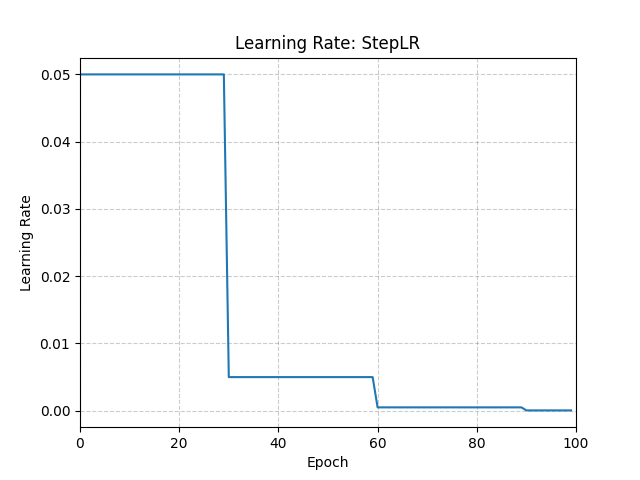StepLR#
- class torch.optim.lr_scheduler.StepLR(optimizer, step_size, gamma=0.1, last_epoch=-1)[source]#
Decays the learning rate of each parameter group by gamma every step_size epochs.
Notice that such decay can happen simultaneously with other changes to the learning rate from outside this scheduler. When last_epoch=-1, sets initial lr as lr.
- Parameters:
Example
>>> # Assuming optimizer uses lr = 0.05 for all groups >>> # lr = 0.05 if epoch < 30 >>> # lr = 0.005 if 30 <= epoch < 60 >>> # lr = 0.0005 if 60 <= epoch < 90 >>> # ... >>> scheduler = StepLR(optimizer, step_size=30, gamma=0.1) >>> for epoch in range(100): >>> train(...) >>> validate(...) >>> scheduler.step()

- get_last_lr()[source]#
Get the most recent learning rates computed by this scheduler.
- Returns:
A
listof learning rates with entries for each of the optimizer’sparam_groups, with the same types as theirgroup["lr"]s.- Return type:
Note
The returned
Tensors are copies, and never alias the optimizer’sgroup["lr"]s.
- get_lr()[source]#
Compute the next learning rate for each of the optimizer’s
param_groups.If the current epoch is a non-zero multiple of
step_size, we scale the currentgroup["lr"]s in the optimizer’sparam_groupsbygamma.- Returns:
A
listof learning rates for each of the optimizer’sparam_groupswith the same types as their currentgroup["lr"]s.- Return type:
Note
If you’re trying to inspect the most recent learning rate, use
get_last_lr()instead.Note
The returned
Tensors are copies, and never alias the optimizer’sgroup["lr"]s.
- load_state_dict(state_dict)[source]#
Load the scheduler’s state.
- Parameters:
state_dict (dict) – scheduler state. Should be an object returned from a call to
state_dict().
- state_dict()[source]#
Return the state of the scheduler as a
dict.It contains an entry for every variable in
self.__dict__which is not the optimizer.
- step(epoch=None)[source]#
Step the scheduler.
- Parameters:
epoch (int, optional) –
Deprecated since version 1.4: If provided, sets
last_epochtoepochand uses_get_closed_form_lr()if it is available. This is not universally supported. Usestep()without arguments instead.
Note
Call this method after calling the optimizer’s
step().
